
CyberSentinel-AI
CyberSentinel AI 是一个自动化安全监控与AI分析系统
Stars: 63
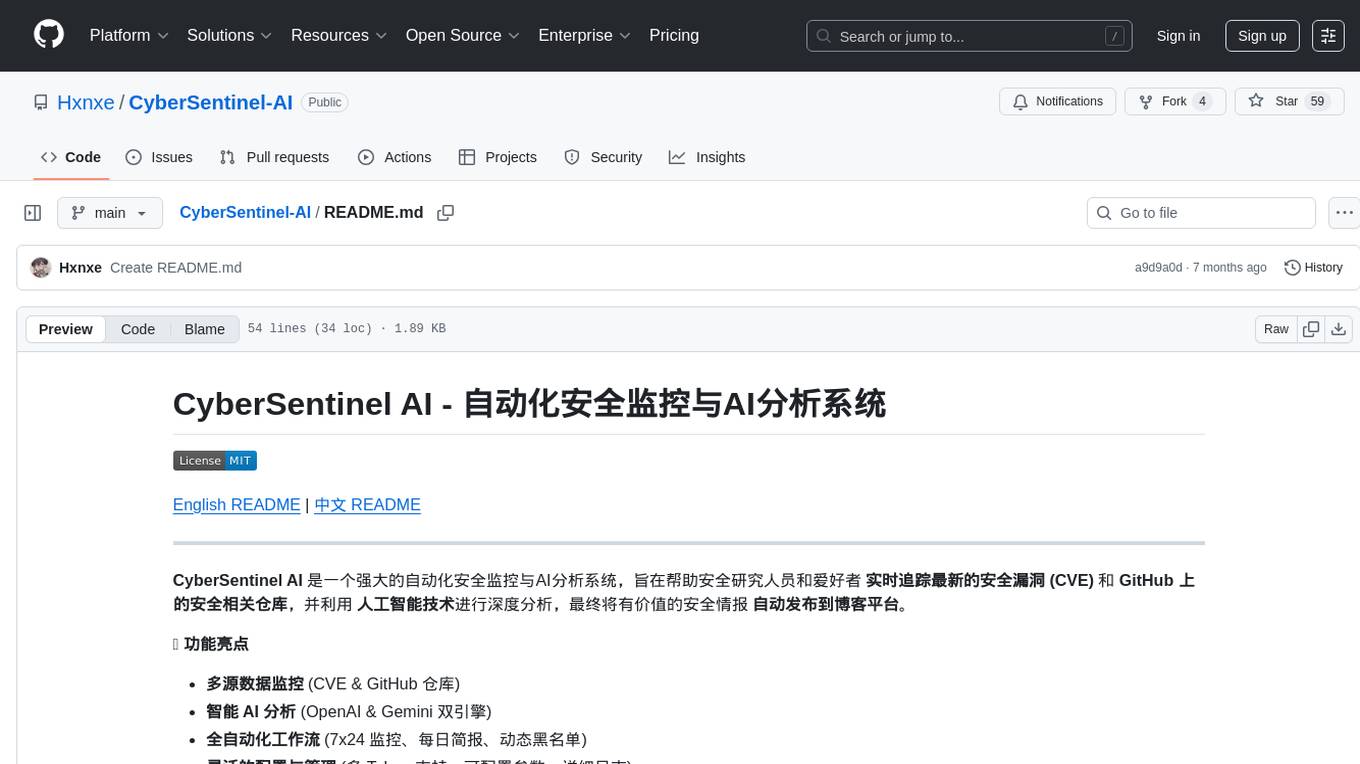
CyberSentinel AI is a powerful automated security monitoring and AI analysis system designed to help security researchers and enthusiasts track the latest security vulnerabilities (CVE) and security-related repositories on GitHub in real-time. It utilizes artificial intelligence technology for in-depth analysis and automatically publishes valuable security intelligence to a blogging platform. The system features multiple data sources monitoring, intelligent AI analysis using OpenAI and Gemini engines, fully automated workflow with 24/7 monitoring, daily briefings, and dynamic blacklists, flexible configuration and management with support for multiple tokens, configurable parameters, and detailed logging, and automatic blog publishing with integrated blogging platform and Markdown reports.
README:
CyberSentinel AI 是一个强大的自动化安全监控与AI分析系统,旨在帮助安全研究人员和爱好者 实时追踪最新的安全漏洞 (CVE) 和 GitHub 上的安全相关仓库,并利用 人工智能技术进行深度分析,最终将有价值的安全情报 自动发布到博客平台。
🚀 功能亮点
- 多源数据监控 (CVE & GitHub 仓库)
- 智能 AI 分析 (OpenAI & Gemini 双引擎)
- 全自动化工作流 (7x24 监控、每日简报、动态黑名单)
- 灵活的配置与管理 (多 Token 支持、可配置参数、详细日志)
- 博客自动发布 (集成博客平台、Markdown 报告)
🛠️ 技术实现
-
监控模块 (Monitors):
cve_monitor.py,github_monitor.py -
AI 分析模块 (AI):
analyzer.py -
数据处理与管理 (Utils):
logger.py,csv_writer.py,article_fetcher.py,article_manager.py,blog_manager.py -
数据库 (Database):
database/models.py -
配置文件 (Config):
config.py -
主程序 (Main):
main.py
⚙️ 运行环境
- Python 3.8+
- 依赖库 (见
requirements.txt)
📦 安装步骤
请参考 English README 或 中文 README 中的详细安装步骤。
📝 后续计划
- 更多数据源支持
- 更精细化的 AI 分析
- 更丰富的功能
- Web UI 管理界面
🤝 贡献
欢迎参与项目贡献!如果您有任何建议或 Bug 报告,请提交 Issue 或 Pull Request。
📜 许可证
本项目采用 MIT 许可证,详情请见 LICENSE 文件。
感谢您的关注! ⭐ Star 本项目以支持我们的工作!
For Tasks:
Click tags to check more tools for each tasksFor Jobs:
Alternative AI tools for CyberSentinel-AI
Similar Open Source Tools

CyberSentinel-AI
CyberSentinel AI is a powerful automated security monitoring and AI analysis system designed to help security researchers and enthusiasts track the latest security vulnerabilities (CVE) and security-related repositories on GitHub in real-time. It utilizes artificial intelligence technology for in-depth analysis and automatically publishes valuable security intelligence to a blogging platform. The system features multiple data sources monitoring, intelligent AI analysis using OpenAI and Gemini engines, fully automated workflow with 24/7 monitoring, daily briefings, and dynamic blacklists, flexible configuration and management with support for multiple tokens, configurable parameters, and detailed logging, and automatic blog publishing with integrated blogging platform and Markdown reports.
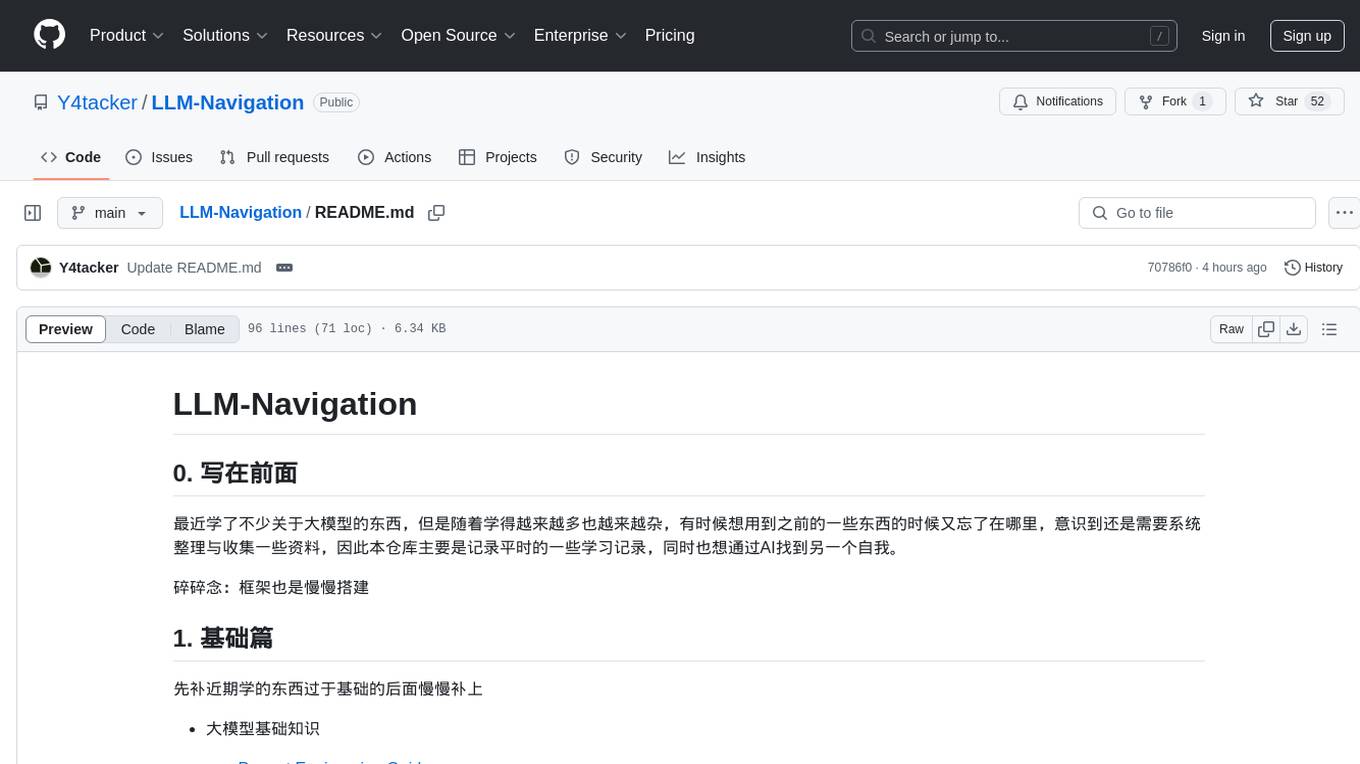
LLM-Navigation
LLM-Navigation is a repository dedicated to documenting learning records related to large models, including basic knowledge, prompt engineering, building effective agents, model expansion capabilities, security measures against prompt injection, and applications in various fields such as AI agent control, browser automation, financial analysis, 3D modeling, and tool navigation using MCP servers. The repository aims to organize and collect information for personal learning and self-improvement through AI exploration.
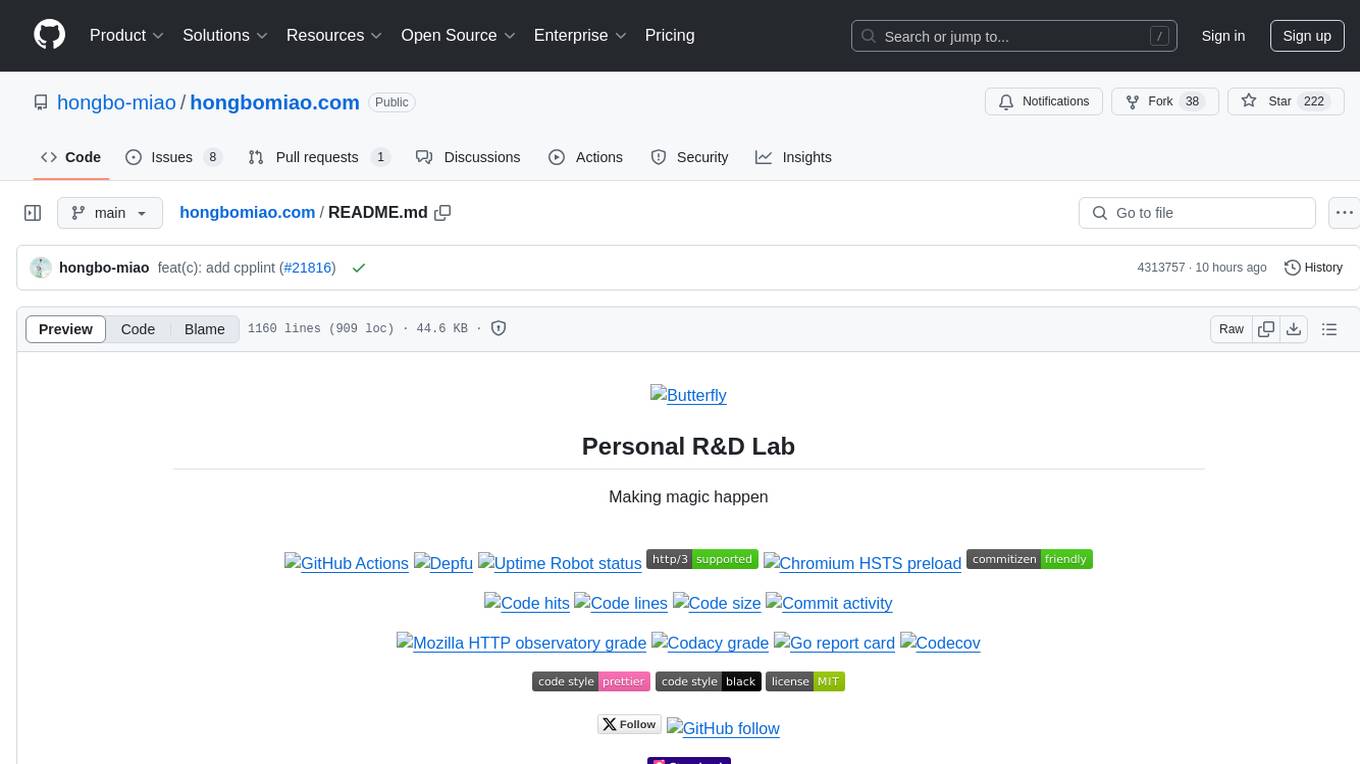
hongbomiao.com
hongbomiao.com is a personal research and development (R&D) lab that facilitates the sharing of knowledge. The repository covers a wide range of topics including web development, mobile development, desktop applications, API servers, cloud native technologies, data processing, machine learning, computer vision, embedded systems, simulation, database management, data cleaning, data orchestration, testing, ops, authentication, authorization, security, system tools, reverse engineering, Ethereum, hardware, network, guidelines, design, bots, and more. It provides detailed information on various tools, frameworks, libraries, and platforms used in these domains.
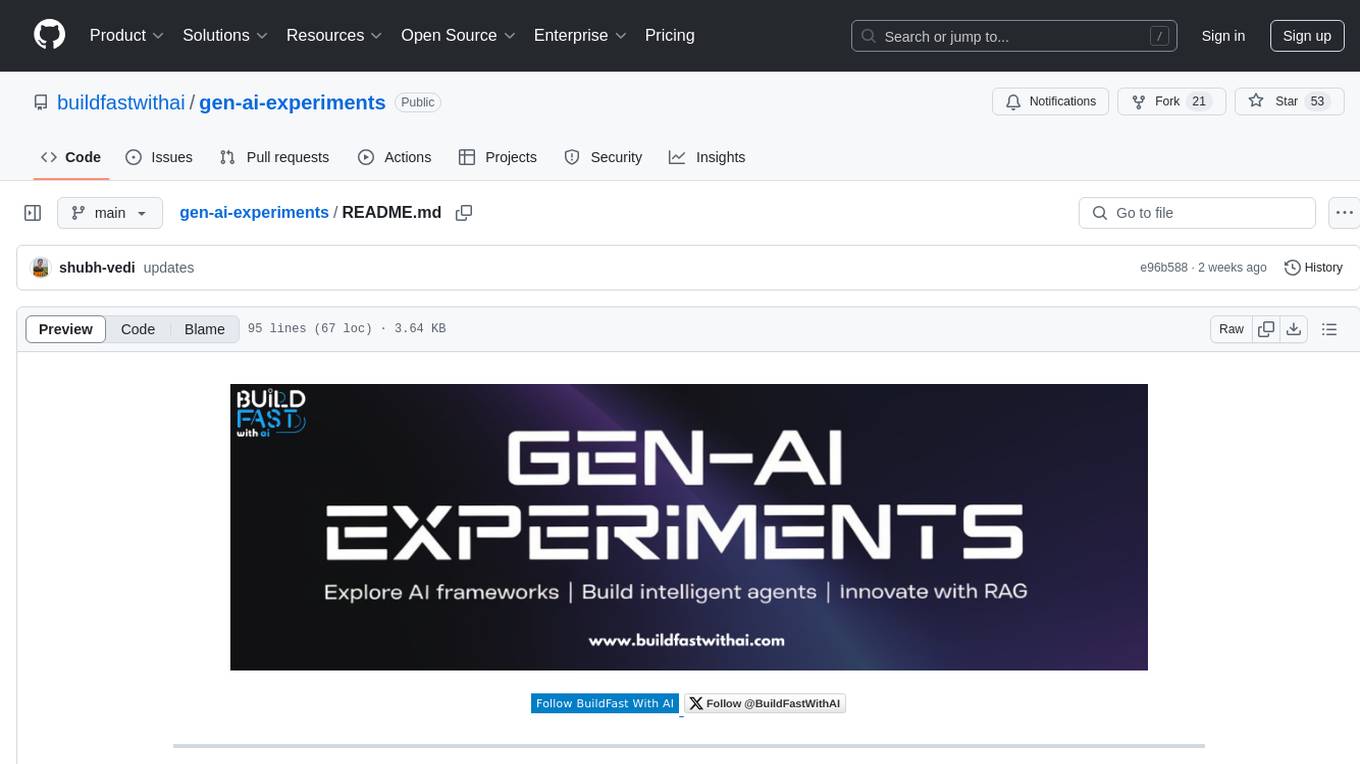
gen-ai-experiments
Gen-AI-Experiments is a structured collection of Jupyter notebooks and AI experiments designed to guide users through various AI tools, frameworks, and models. It offers valuable resources for both beginners and experienced practitioners, covering topics such as AI agents, model testing, RAG systems, real-world applications, and open-source tools. The repository includes folders with curated libraries, AI agents, experiments, LLM testing, open-source libraries, RAG experiments, and educhain experiments, each focusing on different aspects of AI development and application.
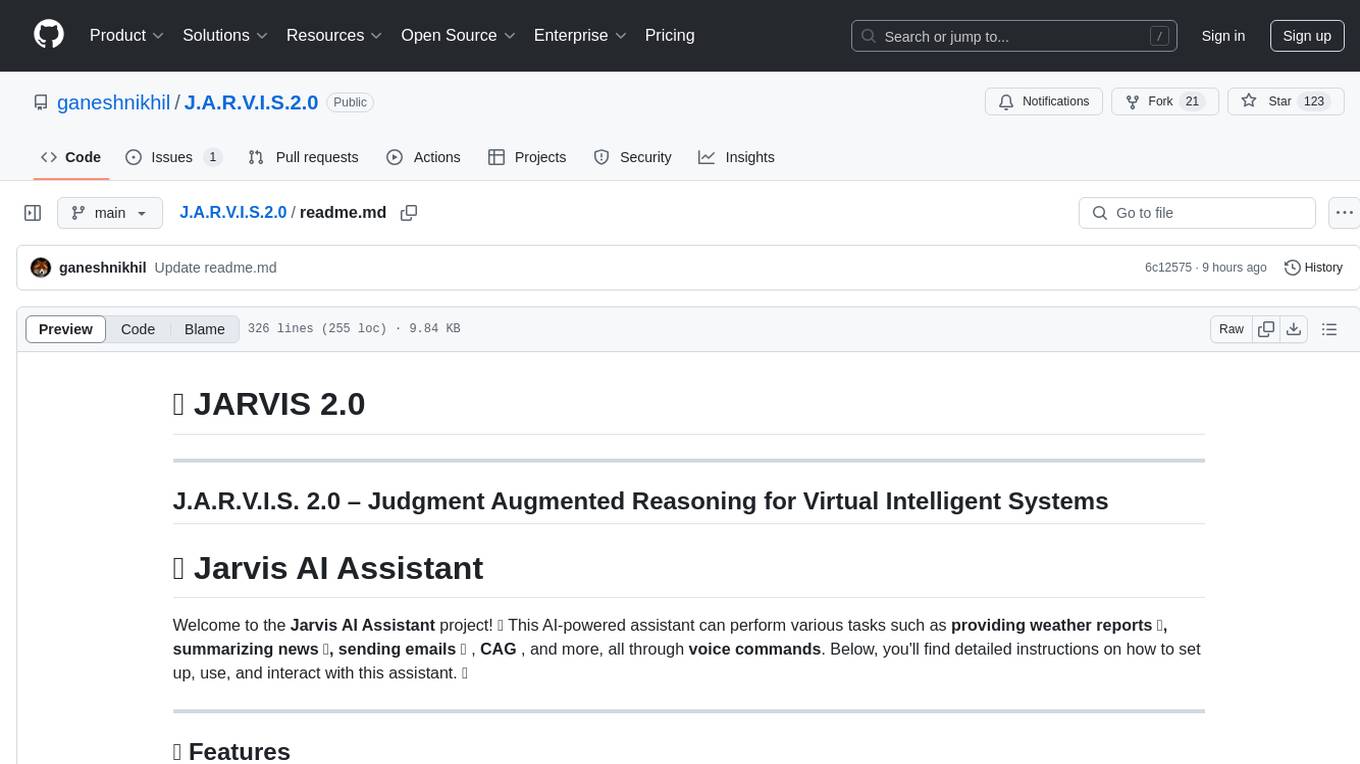
J.A.R.V.I.S.2.0
J.A.R.V.I.S. 2.0 is an AI-powered assistant designed for voice commands, capable of tasks like providing weather reports, summarizing news, sending emails, and more. It features voice activation, speech recognition, AI responses, and handles multiple tasks including email sending, weather reports, news reading, image generation, database functions, phone call automation, AI-based task execution, website & application automation, and knowledge-based interactions. The assistant also includes timeout handling, automatic input processing, and the ability to call multiple functions simultaneously. It requires Python 3.9 or later and specific API keys for weather, news, email, and AI access. The tool integrates Gemini AI for function execution and Ollama as a fallback mechanism. It utilizes a RAG-based knowledge system and ADB integration for phone automation. Future enhancements include deeper mobile integration, advanced AI-driven automation, improved NLP-based command execution, and multi-modal interactions.
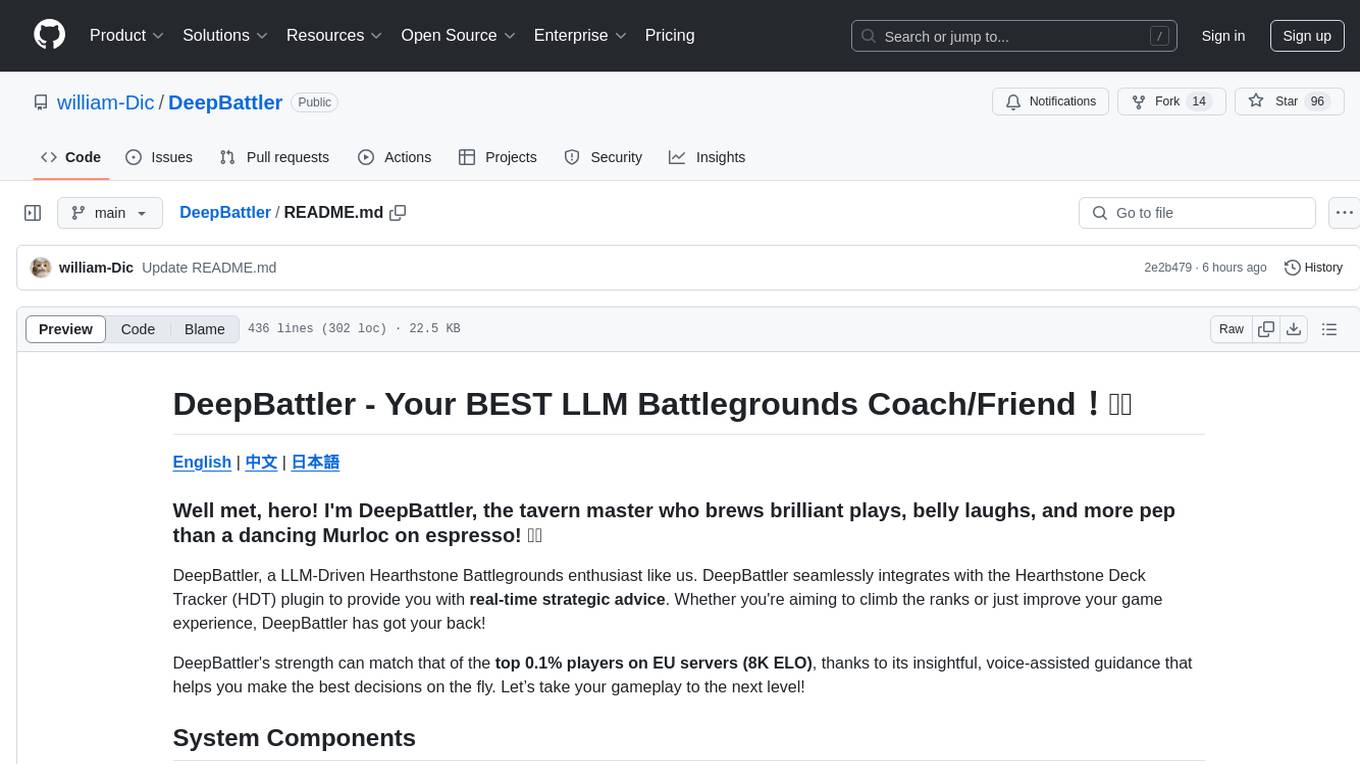
DeepBattler
DeepBattler is a tool designed for Hearthstone Battlegrounds players, providing real-time strategic advice and insights to improve gameplay experience. It integrates with the Hearthstone Deck Tracker plugin and offers voice-assisted guidance. The tool is powered by a large language model (LLM) and can match the strength of top players on EU servers. Users can set up the tool by adding dependencies, configuring the plugin path, and launching the LLM agent. DeepBattler is licensed for personal, educational, and non-commercial use, with guidelines on non-commercial distribution and acknowledgment of external contributions.
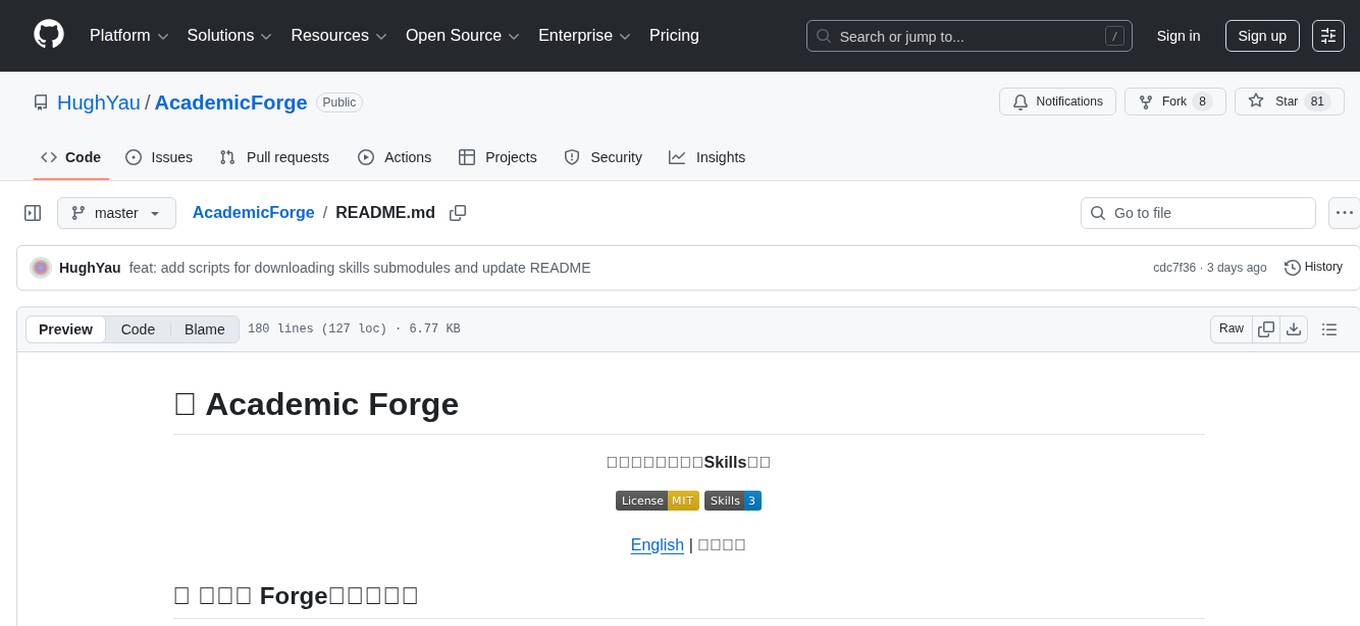
AcademicForge
Academic Forge is a collection of skills integrated for academic writing workflows. It provides a curated set of skills related to academic writing and research, allowing for precise skill calls, avoiding confusion between similar skills, maintaining focus on research workflows, and receiving timely updates from original authors. The forge integrates carefully selected skills covering various areas such as bioinformatics, clinical research, data analysis, scientific writing, laboratory automation, machine learning, databases, AI research, model architectures, fine-tuning, post-training, distributed training, optimization, inference, evaluation, agents, multimodal tasks, and machine learning paper writing. It is designed to streamline the academic writing and AI research processes by providing a cohesive and community-driven collection of skills.
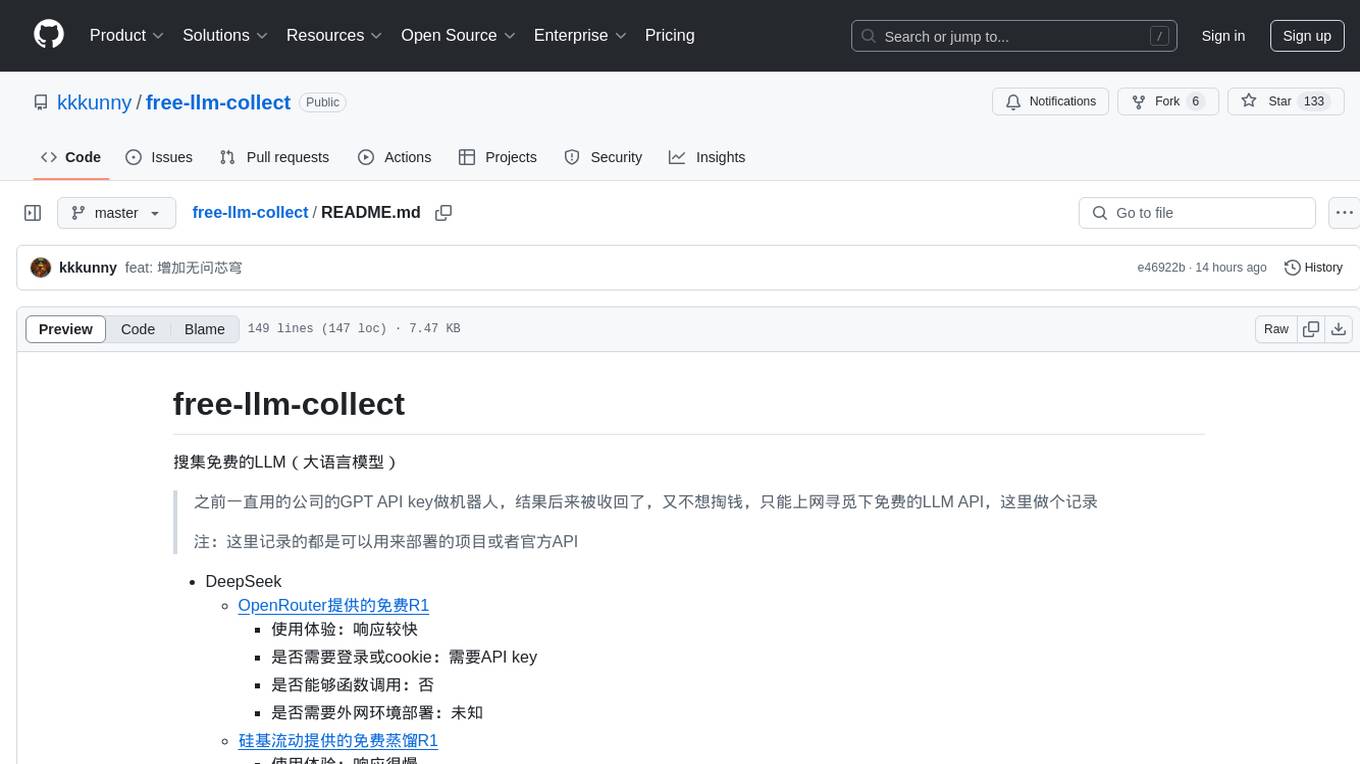
free-llm-collect
This repository is a collection of free large language models (LLMs) that can be used for various natural language processing tasks. It includes information on different free LLM APIs and projects that can be deployed without cost. Users can find details on the performance, login requirements, function calling capabilities, and deployment environments of each listed LLM source.
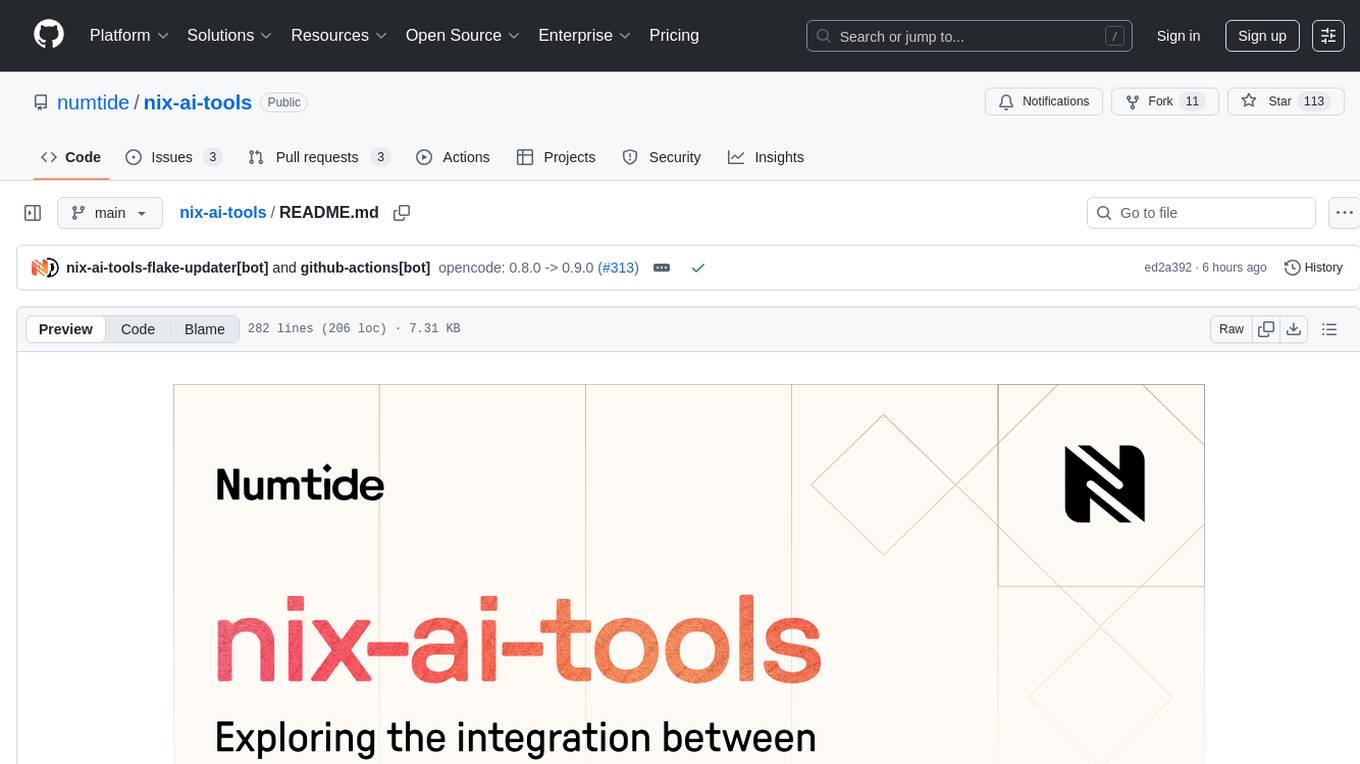
nix-ai-tools
Exploring the integration between Nix and AI coding agents, this repository serves as a testbed for packaging, sandboxing, and enhancing AI-powered development tools within the Nix ecosystem. It provides a collection of AI tools with descriptions, versions, sources, licenses, homepages, and usage instructions. The repository also supports daily updates using GitHub Actions and offers a platform for experimental features like sandboxed execution, provider abstraction, and tool composition in Nix environments. Contributions are welcome, and the Nix packaging code in this repository is licensed under MIT.
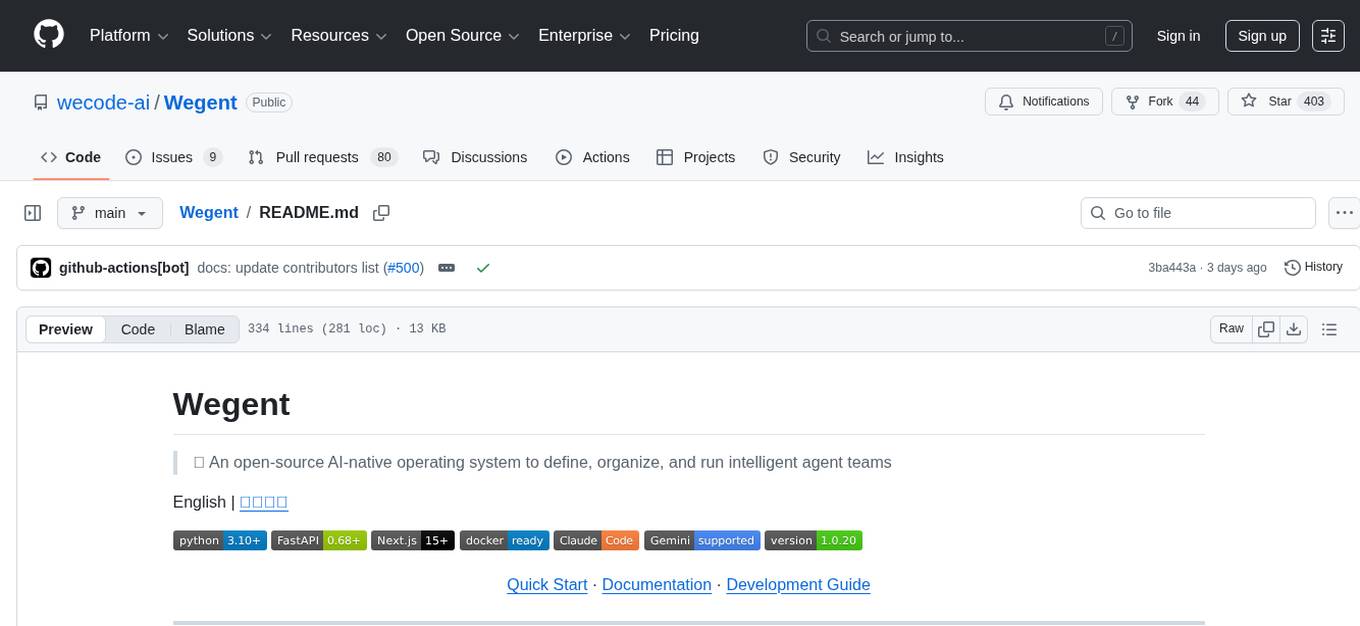
Wegent
Wegent is an open-source AI-native operating system designed to define, organize, and run intelligent agent teams. It offers various core features such as a chat agent with multi-model support, conversation history, group chat, attachment parsing, follow-up mode, error correction mode, long-term memory, sandbox execution, and extensions. Additionally, Wegent includes a code agent for cloud-based code execution, AI feed for task triggers, AI knowledge for document management, and AI device for running tasks locally. The platform is highly extensible, allowing for custom agents, agent creation wizard, organization management, collaboration modes, skill support, MCP tools, execution engines, YAML config, and an API for easy integration with other systems.
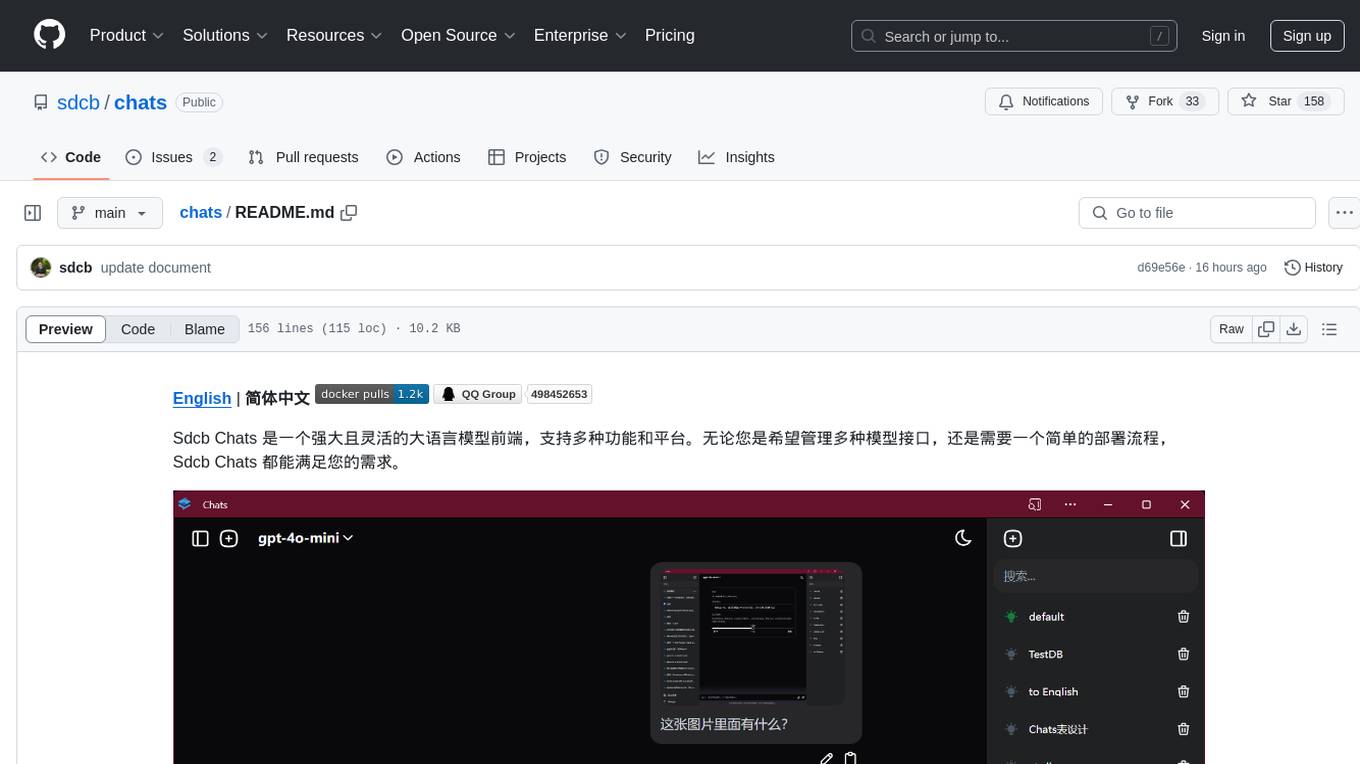
chats
Sdcb Chats is a powerful and flexible frontend for large language models, supporting multiple functions and platforms. Whether you want to manage multiple model interfaces or need a simple deployment process, Sdcb Chats can meet your needs. It supports dynamic management of multiple large language model interfaces, integrates visual models to enhance user interaction experience, provides fine-grained user permission settings for security, real-time tracking and management of user account balances, easy addition, deletion, and configuration of models, transparently forwards user chat requests based on the OpenAI protocol, supports multiple databases including SQLite, SQL Server, and PostgreSQL, compatible with various file services such as local files, AWS S3, Minio, Aliyun OSS, Azure Blob Storage, and supports multiple login methods including Keycloak SSO and phone SMS verification.
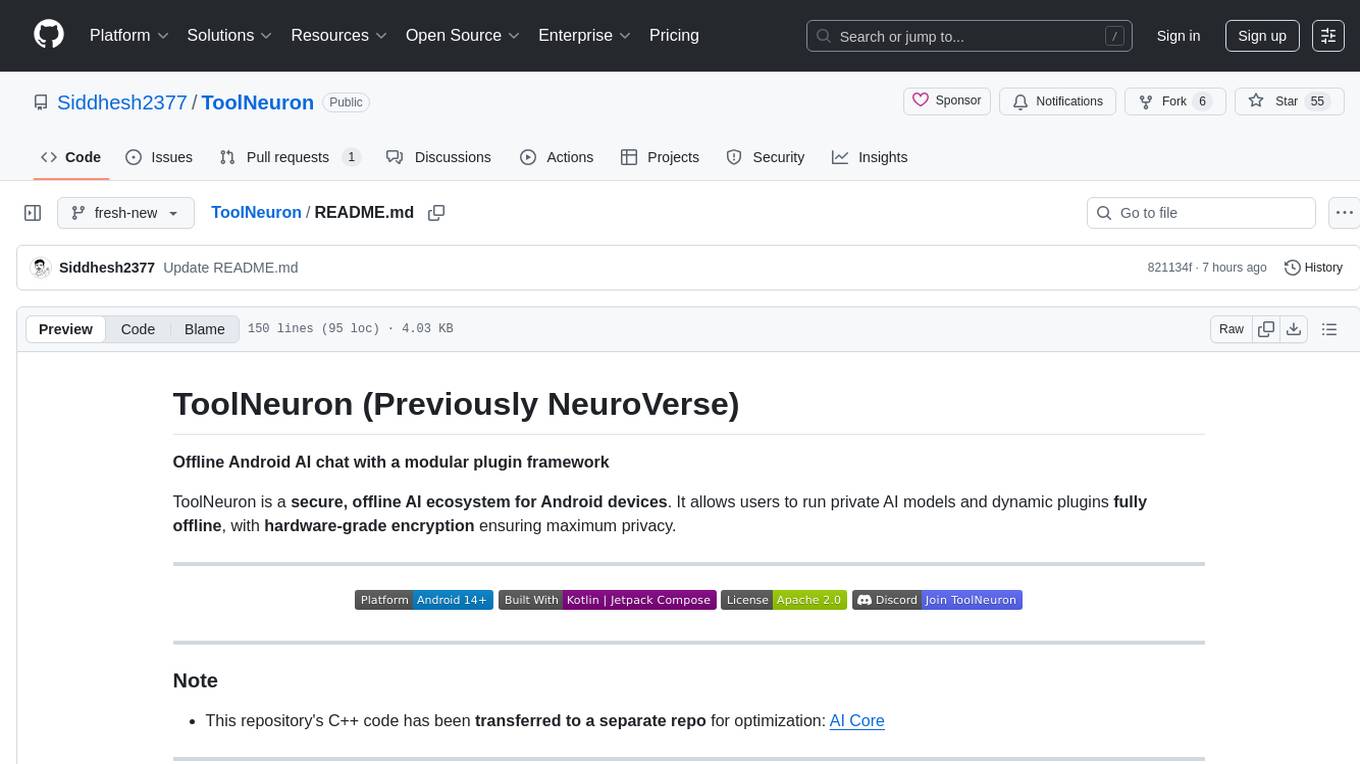
ToolNeuron
ToolNeuron is a secure, offline AI ecosystem for Android devices that allows users to run private AI models and dynamic plugins fully offline, with hardware-grade encryption ensuring maximum privacy. It enables users to have an offline-first experience, add capabilities without app updates through pluggable tools, and ensures security by design with strict plugin validation and sandboxing.
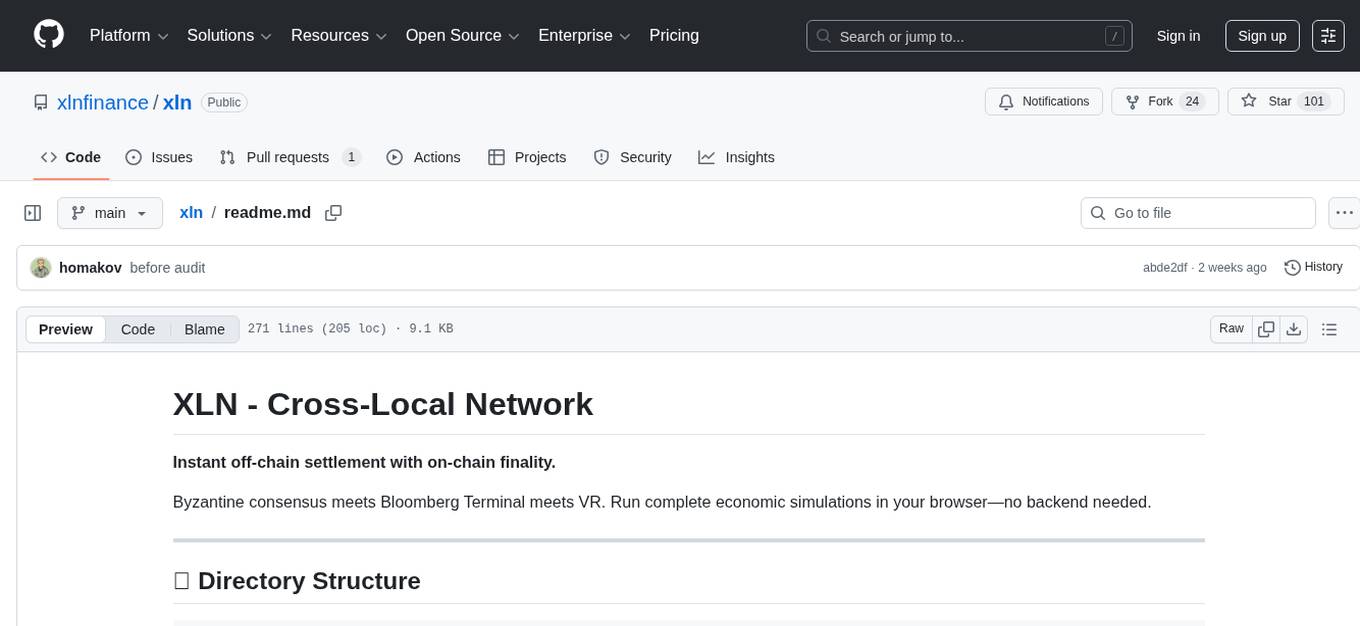
xln
XLN (Cross-Local Network) is a platform that enables instant off-chain settlement with on-chain finality. It combines Byzantine consensus, Bloomberg Terminal functionalities, and VR capabilities to run economic simulations in the browser without the need for a backend. The architecture includes layers for jurisdictions, entities, and accounts, with features like Solidity contracts, BFT consensus, and bilateral channels. The tool offers a panel system similar to Bloomberg Terminal for workspace organization and visualization, along with support for offline blockchain simulations in the browser and VR/Quest compatibility.
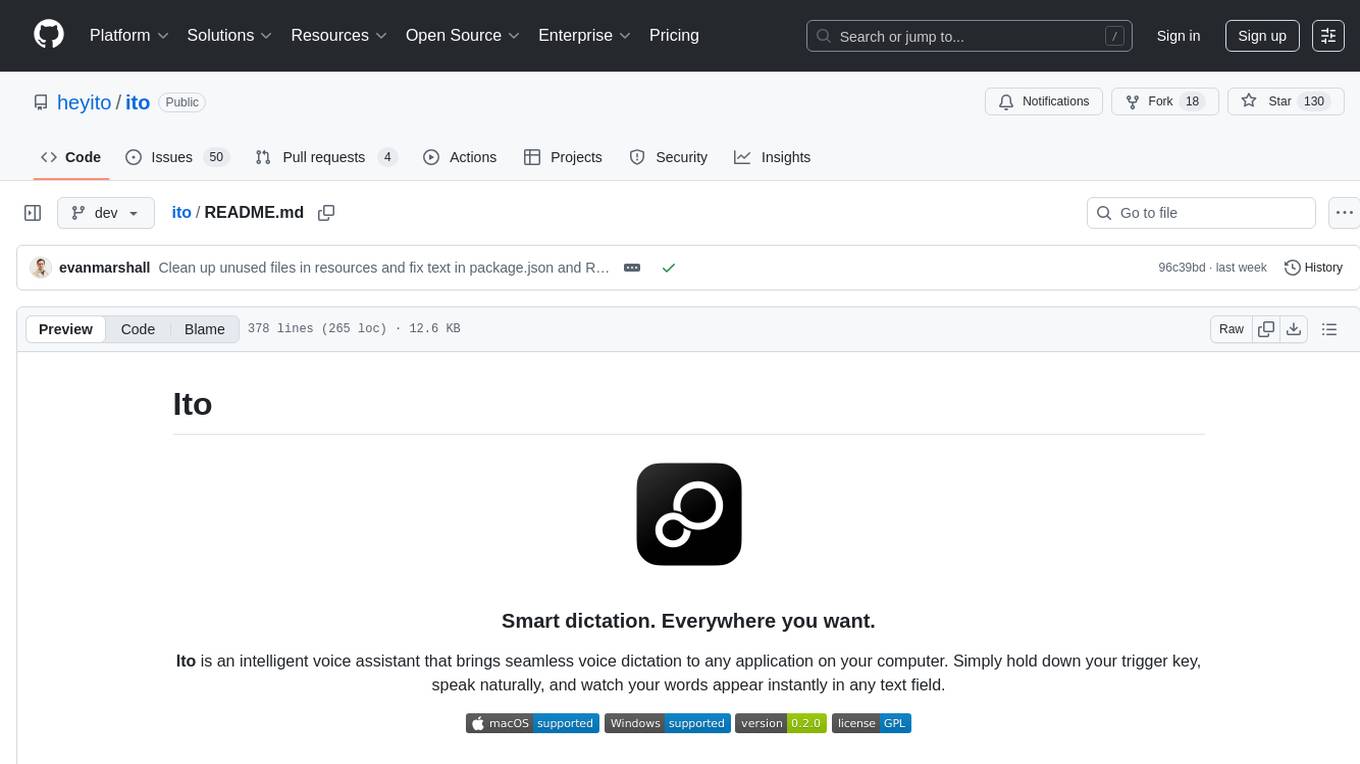
ito
Ito is an intelligent voice assistant that provides seamless voice dictation to any application on your computer. It works in any app, offers global keyboard shortcuts, real-time transcription, and instant text insertion. It is smart and adaptive with features like custom dictionary, context awareness, multi-language support, and intelligent punctuation. Users can customize trigger keys, audio preferences, and privacy controls. It also offers data management features like a notes system, interaction history, cloud sync, and export capabilities. Ito is built as a modern Electron application with a multi-process architecture and utilizes technologies like React, TypeScript, Rust, gRPC, and AWS CDK.
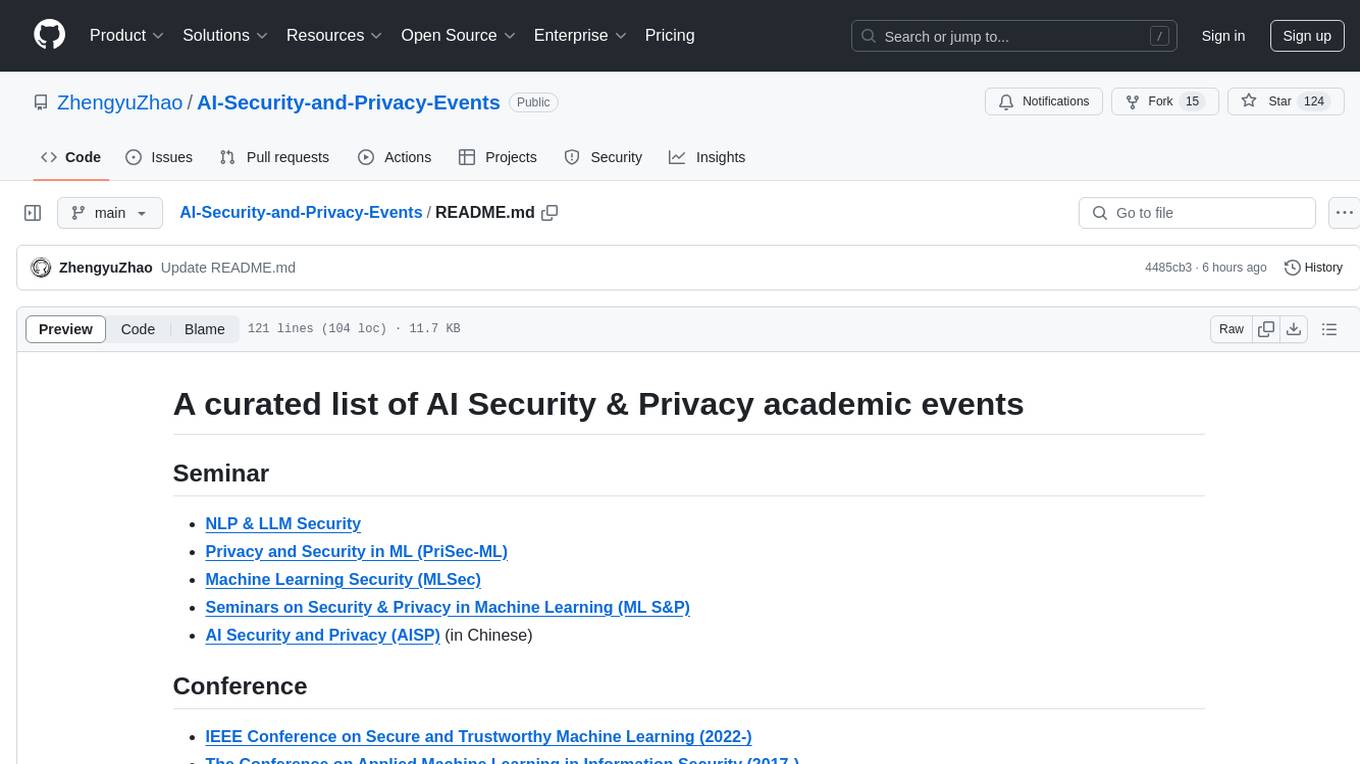
AI-Security-and-Privacy-Events
AI-Security-and-Privacy-Events is a curated list of academic events focusing on AI security and privacy. It includes seminars, conferences, workshops, tutorials, special sessions, and covers various topics such as NLP & LLM Security, Privacy and Security in ML, Machine Learning Security, AI System with Confidential Computing, Adversarial Machine Learning, and more.
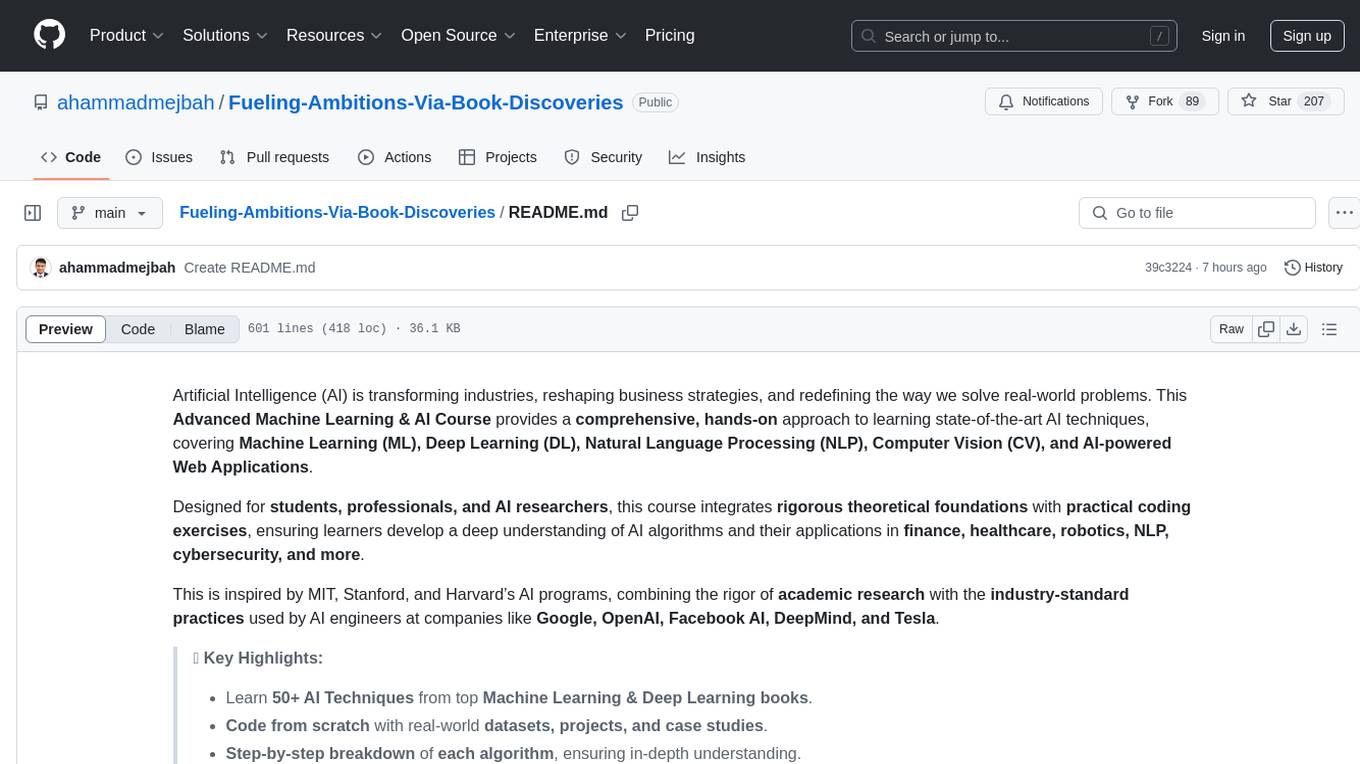
Fueling-Ambitions-Via-Book-Discoveries
Fueling-Ambitions-Via-Book-Discoveries is an Advanced Machine Learning & AI Course designed for students, professionals, and AI researchers. The course integrates rigorous theoretical foundations with practical coding exercises, ensuring learners develop a deep understanding of AI algorithms and their applications in finance, healthcare, robotics, NLP, cybersecurity, and more. Inspired by MIT, Stanford, and Harvard’s AI programs, it combines academic research rigor with industry-standard practices used by AI engineers at companies like Google, OpenAI, Facebook AI, DeepMind, and Tesla. Learners can learn 50+ AI techniques from top Machine Learning & Deep Learning books, code from scratch with real-world datasets, projects, and case studies, and focus on ML Engineering & AI Deployment using Django & Streamlit. The course also offers industry-relevant projects to build a strong AI portfolio.
For similar tasks

CyberSentinel-AI
CyberSentinel AI is a powerful automated security monitoring and AI analysis system designed to help security researchers and enthusiasts track the latest security vulnerabilities (CVE) and security-related repositories on GitHub in real-time. It utilizes artificial intelligence technology for in-depth analysis and automatically publishes valuable security intelligence to a blogging platform. The system features multiple data sources monitoring, intelligent AI analysis using OpenAI and Gemini engines, fully automated workflow with 24/7 monitoring, daily briefings, and dynamic blacklists, flexible configuration and management with support for multiple tokens, configurable parameters, and detailed logging, and automatic blog publishing with integrated blogging platform and Markdown reports.
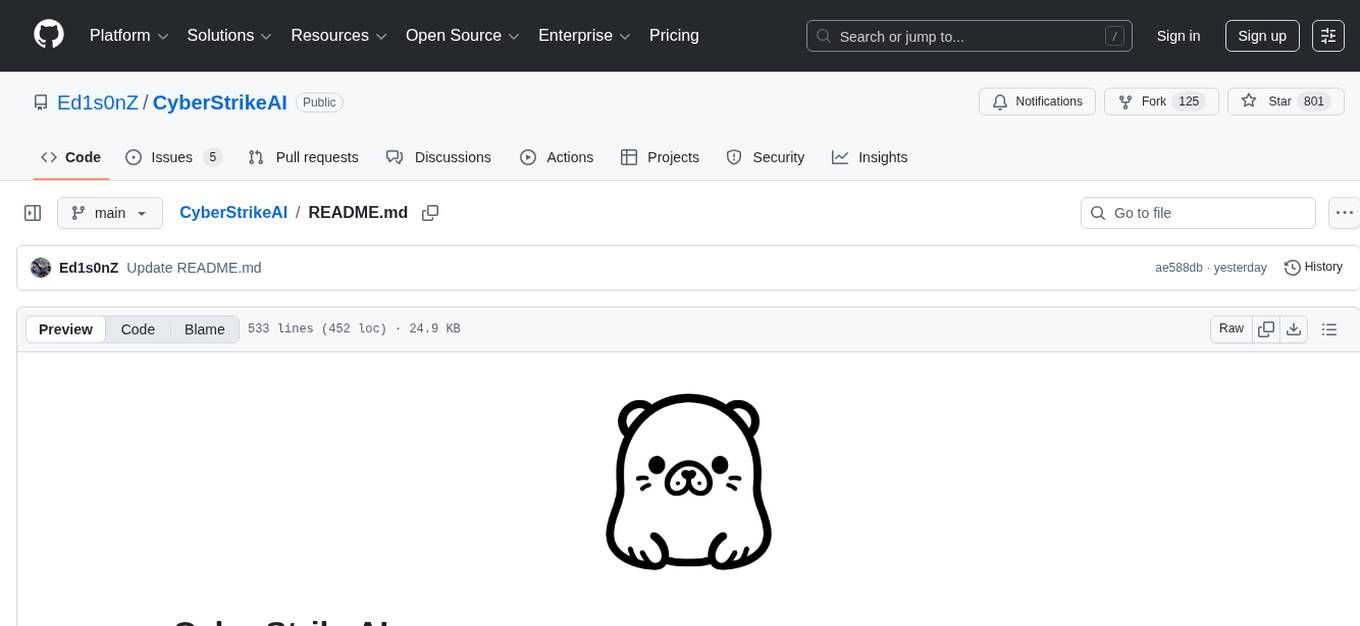
CyberStrikeAI
CyberStrikeAI is an AI-native security testing platform built in Go that integrates 100+ security tools, an intelligent orchestration engine, role-based testing with predefined security roles, a skills system with specialized testing skills, and comprehensive lifecycle management capabilities. It enables end-to-end automation from conversational commands to vulnerability discovery, attack-chain analysis, knowledge retrieval, and result visualization, delivering an auditable, traceable, and collaborative testing environment for security teams. The platform features an AI decision engine with OpenAI-compatible models, native MCP implementation with various transports, prebuilt tool recipes, large-result pagination, attack-chain graph, password-protected web UI, knowledge base with vector search, vulnerability management, batch task management, role-based testing, and skills system.
For similar jobs

CyberSentinel-AI
CyberSentinel AI is a powerful automated security monitoring and AI analysis system designed to help security researchers and enthusiasts track the latest security vulnerabilities (CVE) and security-related repositories on GitHub in real-time. It utilizes artificial intelligence technology for in-depth analysis and automatically publishes valuable security intelligence to a blogging platform. The system features multiple data sources monitoring, intelligent AI analysis using OpenAI and Gemini engines, fully automated workflow with 24/7 monitoring, daily briefings, and dynamic blacklists, flexible configuration and management with support for multiple tokens, configurable parameters, and detailed logging, and automatic blog publishing with integrated blogging platform and Markdown reports.
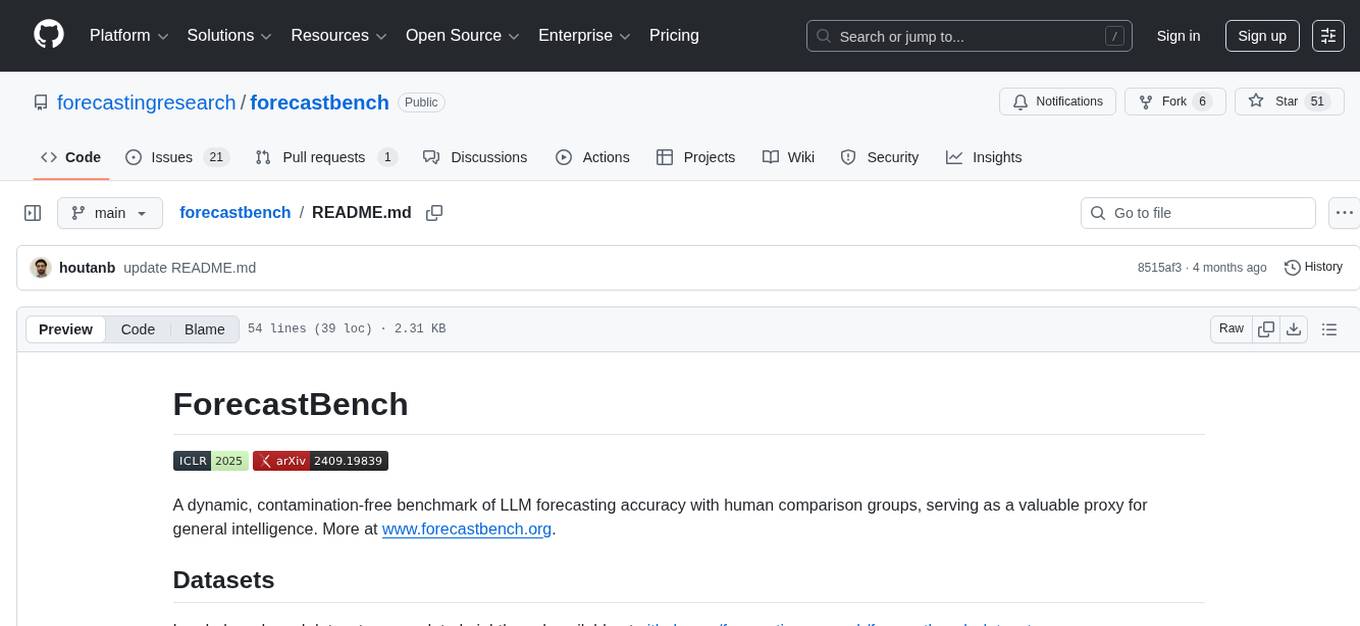
forecastbench
ForecastBench is a dynamic benchmark tool for evaluating LLM forecasting accuracy with human comparison groups. It provides a contamination-free environment and serves as a proxy for general intelligence. The tool offers leaderboards and datasets updated nightly, along with instructions for submitting models. Users can explore detailed information on the wiki and cite the tool using the provided BibTeX citation. Developers can set up the tool locally, run GCP Cloud Functions, and contribute to the project by following specific guidelines.
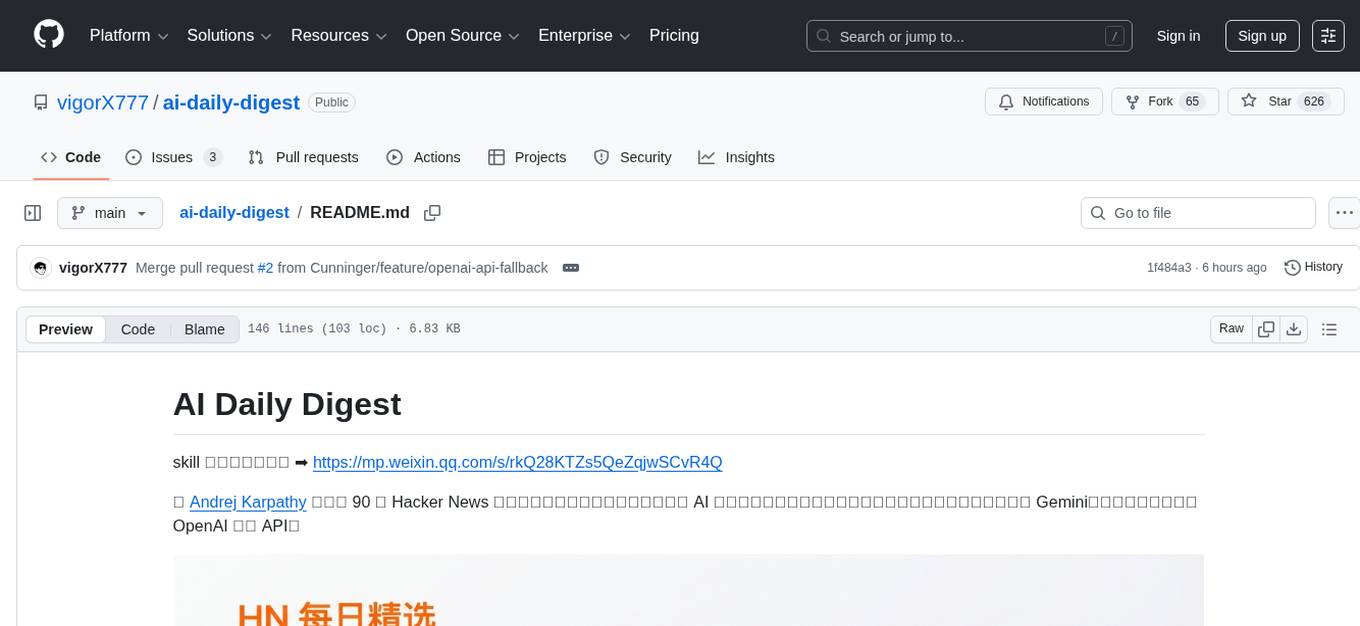
ai-daily-digest
AI Daily Digest is a tool that fetches the latest articles from the top 90 Hacker News technology blogs recommended by Andrej Karpathy. It uses AI multi-dimensional scoring to curate a structured daily digest. The tool supports Gemini by default and can automatically degrade to OpenAI compatible API. It offers a five-step processing pipeline including RSS fetching, time filtering, AI scoring and classification, AI summarization and translation, and trend summarization. The generated daily digest includes sections like today's highlights, must-read articles, data overview, and categorized article lists. The tool is designed to be dependency-free, bilingual, with structured summaries, visual statistics, intelligent categorization, trend insights, and persistent configuration memory.
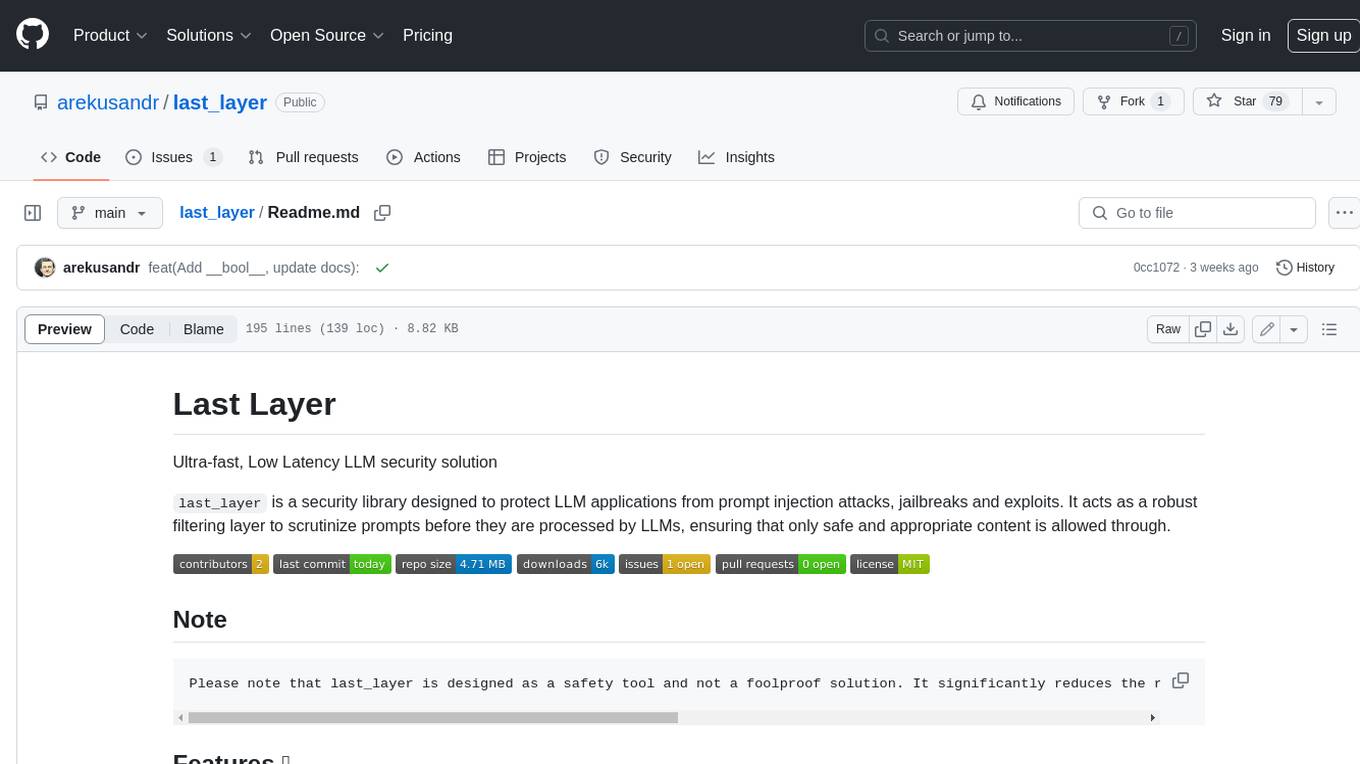
last_layer
last_layer is a security library designed to protect LLM applications from prompt injection attacks, jailbreaks, and exploits. It acts as a robust filtering layer to scrutinize prompts before they are processed by LLMs, ensuring that only safe and appropriate content is allowed through. The tool offers ultra-fast scanning with low latency, privacy-focused operation without tracking or network calls, compatibility with serverless platforms, advanced threat detection mechanisms, and regular updates to adapt to evolving security challenges. It significantly reduces the risk of prompt-based attacks and exploits but cannot guarantee complete protection against all possible threats.
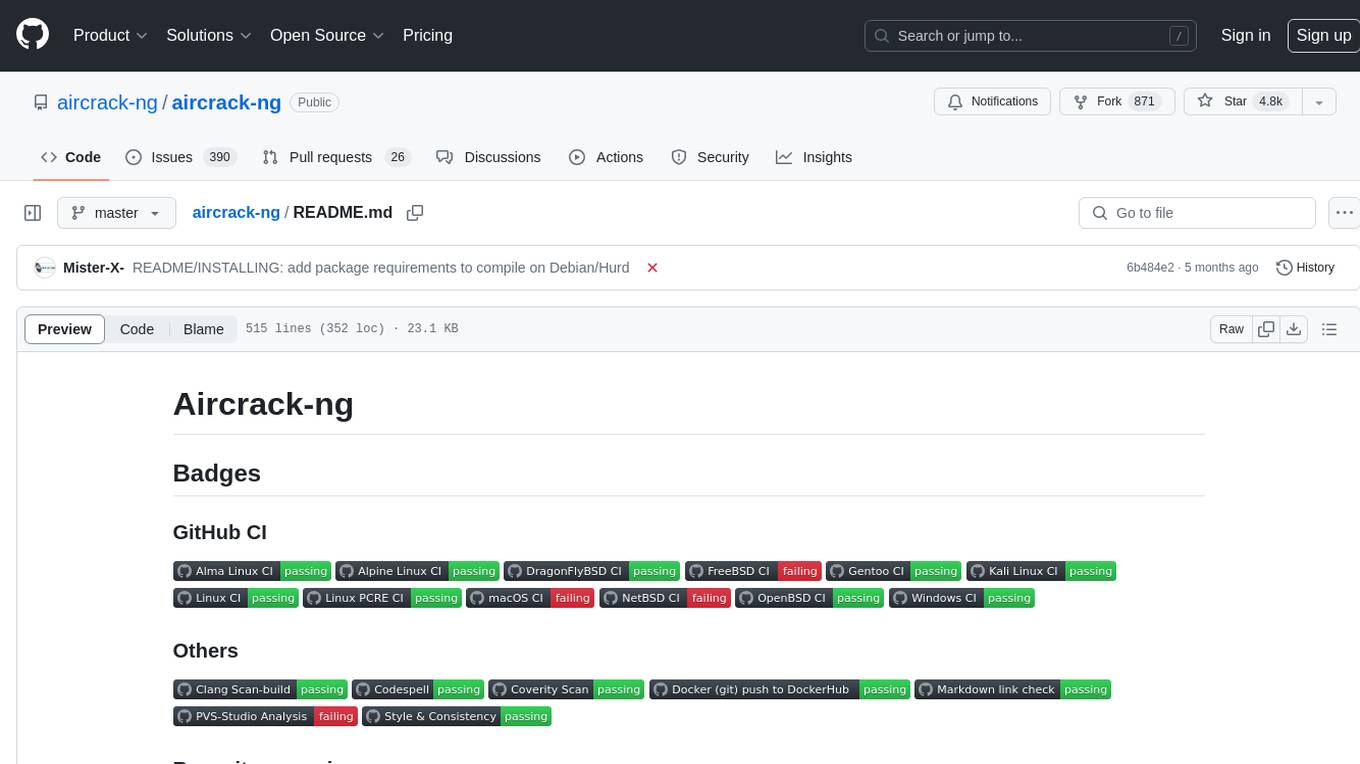
aircrack-ng
Aircrack-ng is a comprehensive suite of tools designed to evaluate the security of WiFi networks. It covers various aspects of WiFi security, including monitoring, attacking (replay attacks, deauthentication, fake access points), testing WiFi cards and driver capabilities, and cracking WEP and WPA PSK. The tools are command line-based, allowing for extensive scripting and have been utilized by many GUIs. Aircrack-ng primarily works on Linux but also supports Windows, macOS, FreeBSD, OpenBSD, NetBSD, Solaris, and eComStation 2.
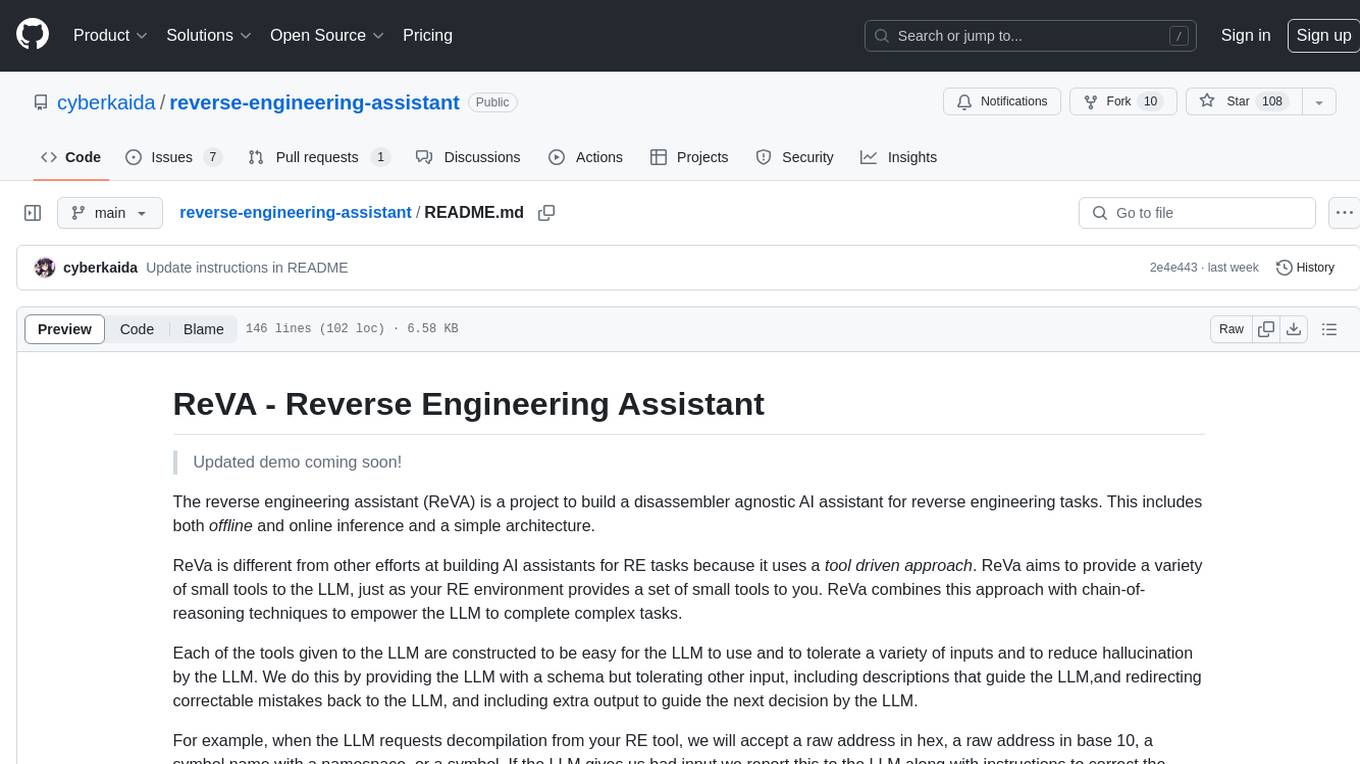
reverse-engineering-assistant
ReVA (Reverse Engineering Assistant) is a project aimed at building a disassembler agnostic AI assistant for reverse engineering tasks. It utilizes a tool-driven approach, providing small tools to the user to empower them in completing complex tasks. The assistant is designed to accept various inputs, guide the user in correcting mistakes, and provide additional context to encourage exploration. Users can ask questions, perform tasks like decompilation, class diagram generation, variable renaming, and more. ReVA supports different language models for online and local inference, with easy configuration options. The workflow involves opening the RE tool and program, then starting a chat session to interact with the assistant. Installation includes setting up the Python component, running the chat tool, and configuring the Ghidra extension for seamless integration. ReVA aims to enhance the reverse engineering process by breaking down actions into small parts, including the user's thoughts in the output, and providing support for monitoring and adjusting prompts.
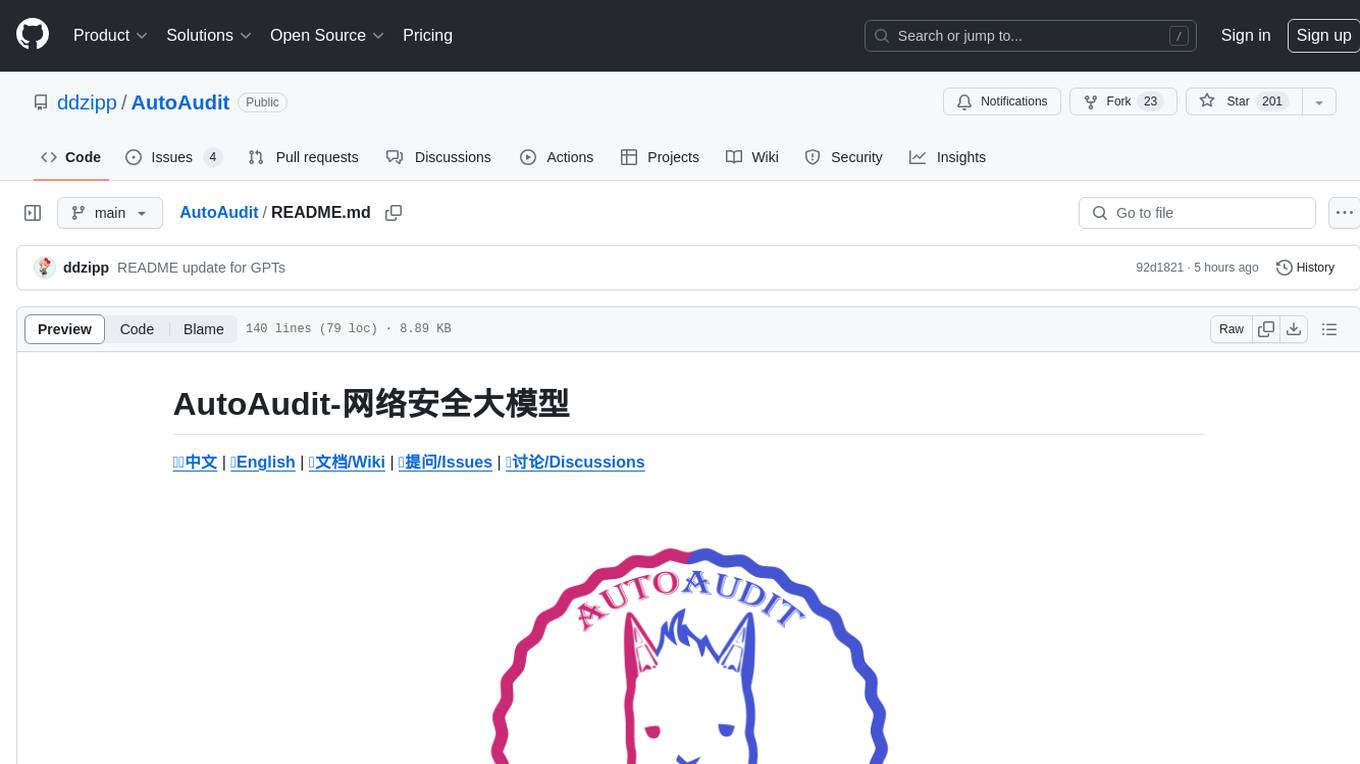
AutoAudit
AutoAudit is an open-source large language model specifically designed for the field of network security. It aims to provide powerful natural language processing capabilities for security auditing and network defense, including analyzing malicious code, detecting network attacks, and predicting security vulnerabilities. By coupling AutoAudit with ClamAV, a security scanning platform has been created for practical security audit applications. The tool is intended to assist security professionals with accurate and fast analysis and predictions to combat evolving network threats.
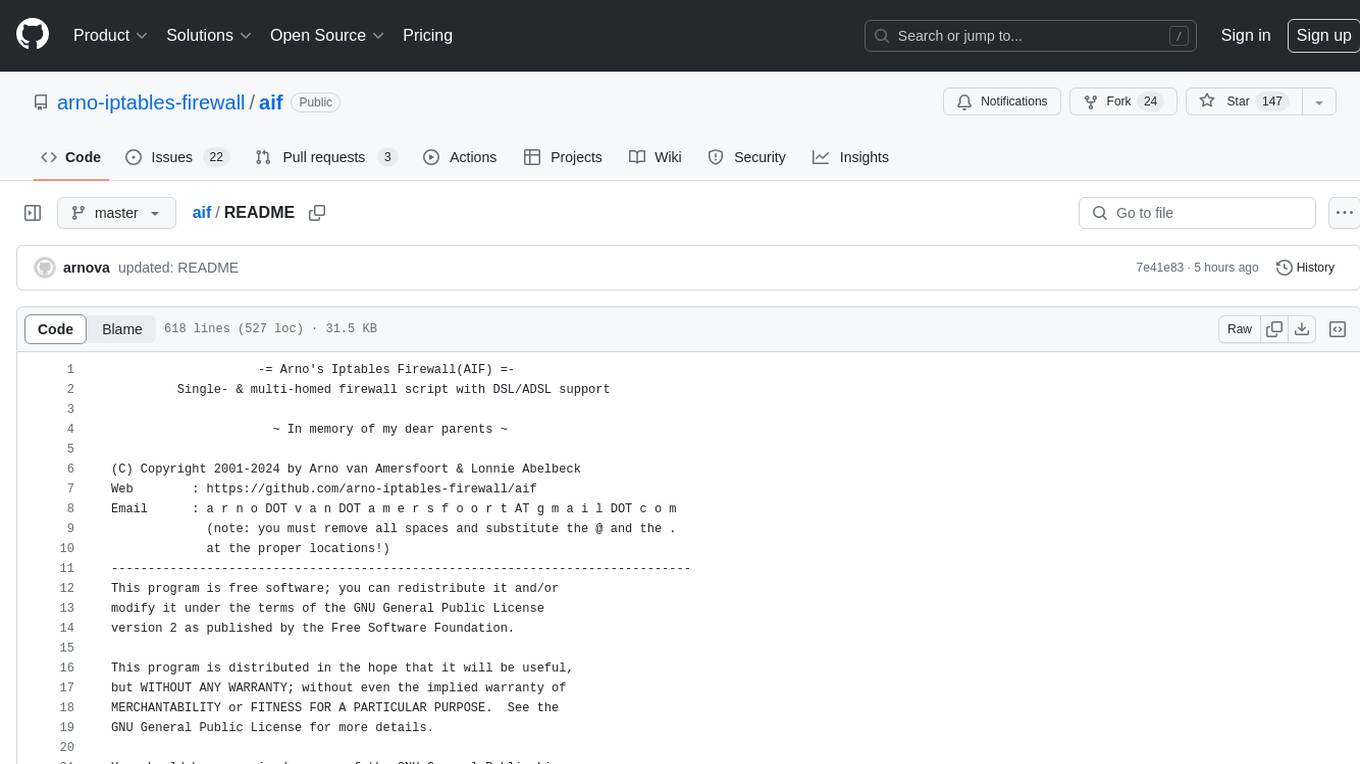
aif
Arno's Iptables Firewall (AIF) is a single- & multi-homed firewall script with DSL/ADSL support. It is a free software distributed under the GNU GPL License. The script provides a comprehensive set of configuration files and plugins for setting up and managing firewall rules, including support for NAT, load balancing, and multirouting. It offers detailed instructions for installation and configuration, emphasizing security best practices and caution when modifying settings. The script is designed to protect against hostile attacks by blocking all incoming traffic by default and allowing users to configure specific rules for open ports and network interfaces.
